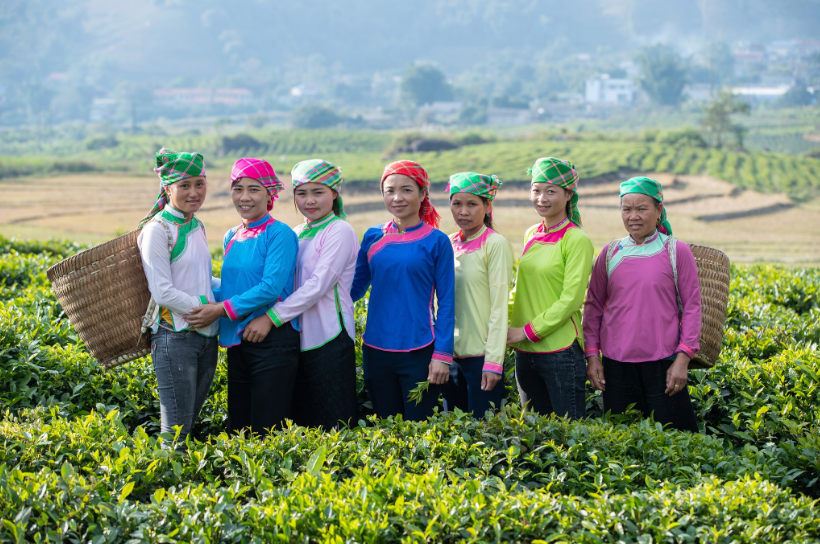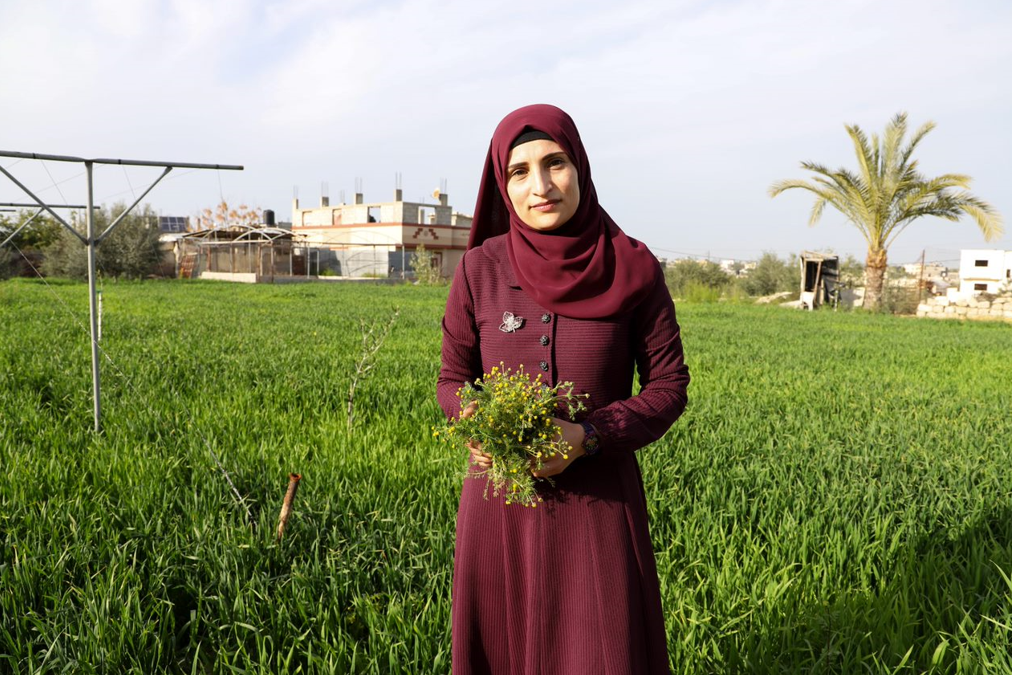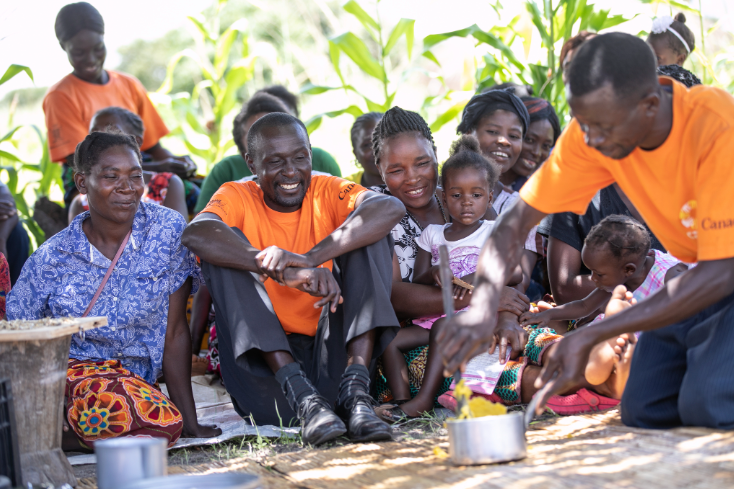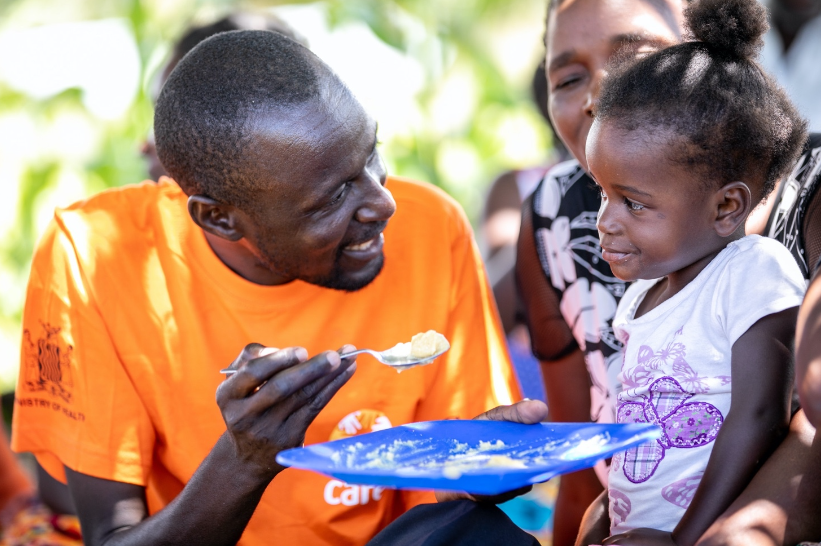
Photo credit: Karin Schermbrucker/CARE
Stephen Chilufya, a 48-year-old male action group leader, takes his granddaughter to a clinic.
Why no one is left behind by a feminist international assistance policy
Canada was one of the first countries in the world to put in place a feminist international assistance policy in 2017. But what does having a feminist approach to international assistance mean? Are we leaving men and boys behind to prioritize women? Absolutely not.
The Feminist International Assistance Policy (FIAP) is feminist because it addresses the root causes of poverty through an intersectional, human rights-based and feminist lens, meaning it considers multiple and overlapping forms of discrimination. This enablesus to identify the groups and individuals in situations of extreme poverty, vulnerability and marginalization. The FIAP looks to level the playing field by addressing key barriers to equality. This is important because we cannot eliminate poverty without considering the needs of different groups of people.

Photo credit: Vu Ngoc Dung/CARE (2021)
In nothern Vietnam, CARE facilitates dialogues among small groups of men and women where they learn about the unpaid care imbalance and how to improve women’s economic well-being.
An estimated 55% of the global population faces instability and poverty. Entrenched gender inequalities affect women and girls more than men and boys, and in different ways. This is true both in Canada and around the world, particularly for women and groups pushed to the peripheries of society. To create a more peaceful and prosperous world for everyone, we need to tackle inequalities so that people — no matter their gender identity or expression, sex characteristics or other identity factors — can fully enjoy their human rights. The Feminist Policy’s goal is to reduce poverty around the world; interventions that advance gender equality are proven to make the most significant progress toward this goal.
45 million fewer hungry people
A United Nations study found that closing the gender gap on farms and in agrifood systems would increase global gross domestic product by nearly a trillion US dollars. This would reduce the number of food-insecure people by 45 million. That’s 1 of many statistics that illustrate current inequality.
If half of small-scale producers benefited from development interventions that focused on empowering women, it would significantly raise the incomes of an additional 58 million people and increase the resilience of an additional 235 million people.
This is why Canada funds projects like SeedChange, which ensured women made up 50% of the leadership positions in collective enterprises like farming co-ops and increased participation in traditionally male-dominated areas. SeedChange targeted the Central American Dry Corridor, Burkina Faso, Mali and Ethiopia, where it helped increase seed, food and economic security for 26,046 small-scale farm households. As a result of the project, households grew more fruits and vegetables, along with more diverse crops, making more food available to families living in poverty. The data collected over five years proved the project led tohealthier diets, better livelihoods, improved climate resilience, and greater autonomy in every community. More than 100 women’s groups and almost 40 youth-run co-ops broke down the barriers they faced to entering the marketplace.
In Gaza, female-headed households are far more likely to live in poverty and experience pronounced inequality in a society where traditional gender roles dominate. Through the Canada-funded Salalem Leadership Institute, Sarah, a single parent of 2, joined an 8-week entrepreneurship training program and received support for her agricultural startup.
“I was born and raised as a farmer,” says Sarah. “Since I was young, I have grown and tended to the plants. With the help of my mother and brothers, I succeeded to start my dream business that will provide my children a secured future.”
Sarah received mentorship support through Salalem to improve fer farming practices and expand her business. Sarah has so far harvested crops for at least 6 consecutive farming seasons. After one year of successfully running her business she was able to rent a bigger piece of land to diversify and increase her farming productions. She also bought goats, which helped her to start up an animal breeding and productions line.

Photo credit: Haya Abu Qusa
Woman farmer and entrepreneur Sarah defies Gaza’s gender norms as the sole provider for her children..
Improved well-being and health for men and boys
Throughout the world, harmful masculinities compromise men’s health by encouraging them to equate being “manly” with various risky behaviours. These can include having multiple sexual partners, abusing alcohol and other substances, using violence and being unwilling to seek health services or emotional support out of fear of being perceived as weak. In addition to the obvious implications for the health and well-being of men and boys, these behaviours — as with unsafe sex and substance abuse — can have grave consequences for the women and children in their lives.
Globally, almost 1 in 3 women have been subjected to intimate partner violence, non-partner sexual violence or both at least once in their lifetime. When you invest in gender equality and the health and rights of girls and women, there is a ripple effect, and everybody wins. And there is no downside when men take responsibility for gender equality.
Like many men in his rural community of Mpepo in northern Zambia, Stephen Chilufya, 48, once did little around the home to care for his wife and 7 children. When he became a gender champion under CARE Canada’s Southern Africa Nutrition Initiative (SANI), he started speaking to the members of male action groups about sharing household responsibilities equally, including preparing and preserving food, and the nutritional value of various foods. And he leads by example: “I now cook, wash plates and involve my wife in decision making,” says Chilufya, noting that through the project the couple learned to “work together for 1 cause—the family.”
Practical measures fostered under the project included the construction and rehabilitation of conveniently located water points, which reduces the time spent by women and girls on domestic work. Catherine Pongolani, manager of SANI, says the project also aims to involve men and women in activities that support nutrition, and maternal and child health.
Male role models such as Chilufya help to challenge stereotypes about domestic roles, she says. Action groups sensitize men and women about the need to distribute domestic work more equitably, while avoiding harmful traditions such as husbands eating first. “It means changing behaviour, and it takes time,” Pongolani points out.

Photo credit: Karin Schermbrucker/CARE
Chilufya’s cooking demonstrations and seed distribution help participants gain knowledge of nutrition.
Men who embrace non-violent and fair practices tend to be happier and healthier, and this is reflected in happier familiesFootnote 1 . When men don’t have to cement themselves in rigid toxic masculinity, they can adopt gender-equal behaviors and attitudes that challenge harmful social norms and inequalities.
Increase global wealth by more than US$160 trillion
Closing the gender wage gap could increase human capital wealth by more than US$160 trillionFootnote 2. For context, this is roughly double the value of global GDP. But on a more personal level, when children see their fathers equally engage in domestic care and work, and value their education, boys grow up to do the same, and girls go on to work outside the home, often in jobs that transcend gender stereotypes. In turn, when women are empowered to access the same opportunities as men, they enter and remain in the labour force, gaining economic independence, strengthening economies and enabling development. This is the type of societal change that can break the generational cycle of poverty and lead to sustainable development.

Photo credit: Karin Shermbrucker/CARE
A gender champion, Stephen Chilufya leads by example to promote gender equality in his household and community.
A stronger, more inclusive peace
And the benefits glow brighter than just at home. They extend to communities and even beyond borders. When individuals, communities and institutions treat people of all genders as equal in both dignity and rights, the society they live in is more peaceful and inclusive. According to UN Women, when women are included in peace processes, the resulting agreements are 35% more likely to last at least 15 years. Even when women’s groups had only moderate influence, an agreement was reached in most cases. When women’s groups were not involved at all, or had a little influence, the chance of reaching an agreement was considerably lower.
But equality will not happen if norms and expectations are not challenged. According to the World Economic Forum, as of 2021, at the current rate of progress, it will take 132 years to reach full gender parity, considering economic participation and opportunity, educational attainment, health, survival and political empowerment.
Gender equality helps entire communities
There is ample evidence that the benefits of investing in gender equality expand beyond women, girls and gender-diverse people; men, boys and entire communities also benefit from efforts to undo harmful gender norms and attitudes. This is increasingly recognized as a key factor in reducing global poverty. And while progress can be slow and no country has achieved gender equality, every step is important. The participation of men and boys in this process is paramount to success.
- Date Modified: